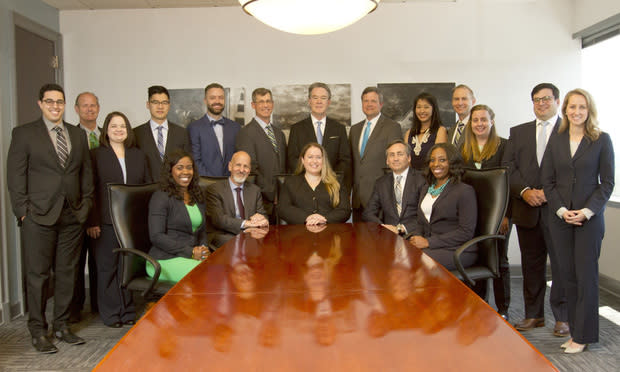Litigation Teams of the Year: (General Litigation-Small Firm): Gray, Rust, St. Amand, Moffett & Brieske
[caption id="attachment_14435" align="alignleft" width="620"]

The attorneys at Gray, Rust, St. Amand, Moffett & Brieske, Atlanta.[/caption]
The 18 lawyers at Gray, Rust, St. Amand, Moffett & Brieske won key defense verdicts for clients involved in a host of accidents, including a dog bite that had precedential implications.
In the dog bite case, the firm represented a woman whose dog bit a man in Piedmont Park. The trial court held that the woman was automatically liable for the bite on the theory that a dog biting someone proved that the dog was not under competent control. Seeing the case as dangerous for any dog owner, the firm won a reversal at the Court of Appeals of Georgia. The case was remanded for trial.
Representing a secondary insurer that covered verdicts that exceeded a primary insurer's limits, the firm also won a defense verdict in a car accident case in which the plaintiff had collected $1 million from the primary insurer. In the excess insurance case, the plaintiff had asked for at least $18 million.
Here is our Q&A with the firm.
What is the key to representing defendants in civil litigation where your clients are portrayed as faceless companies or insurers standing in the way of an injured plaintiff?
Corporations and insurance companies will be judged by the personal credibility of their employee witnesses. The vast majority of people that work for businesses, regardless of the level, are just hardworking, honest folks who don’t want to cause any harm or hurt anyone. The vast majority of business executives are genuinely concerned about safety for their own employees and the general public. The best way not to be portrayed as faceless is to have a corporate face, presented by honest, well-prepared witnesses. In almost every type of case now, we spend a significant amount of time working with witnesses so that they are not intimidated by the process or opposing counsel and are prepared, in a deposition or trial, to get their message across.
How do you see the advent of self-driving automobiles and trucks changing the nature of accident litigation?
The widespread use of self-driving vehicles (or autonomous features such as automatic braking systems) will inevitably lead to less accidents and less injuries, but it will complicate and prolong litigation for numerous reasons. For example, in many accidents involving autonomous vehicles, there will be additional targets to either sue or for a defendant driver to blame. This will likely include a products liability aspect to most claims that can involve the manufacturer, seller and component manufacturer. Additionally, claims will be asserted for inadequate warnings and instructions. These claims are likely to be in addition to (rather than instead of) claims against the “driver” or “operator.” Adding numerous corporate defendants to a higher percentage of cases will result on longer, more complex and, of course, costlier litigation. The stakes are also raised when a corporate “deep pocket” is a defendant, as jury verdicts tend to increase exponentially when corporations are targeted.
What is the best time-saving tool your team (or individuals on it) use to be most efficient in litigation?
Clear and consistent communication, both inside and outside the firm, is the best time-saving tool for any busy litigation team. For every defense case, the corporate client expects a successful resolution from an efficient defense. We meet this expectation through our focused evaluation and subsequent dialog with the client. Throughout the life of the case, our defense team asks and answers one of the below questions:
How do we advance this case efficiently to a successful resolution?
How are we advancing this case efficiently to a successful resolution?
How did we advance this case efficiently to a successful resolution?
When we focus the defense team on client expectations through continuous case evaluation, we exceed expectations. And remember—always bill your time contemporaneously with the legal task performed! You will be more accurate and efficient.

